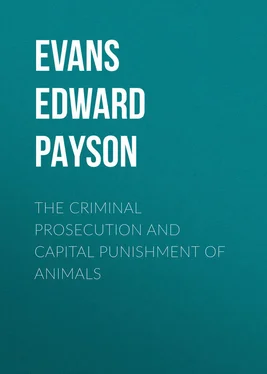Edward Evans - The Criminal Prosecution and Capital Punishment of Animals
Здесь есть возможность читать онлайн «Edward Evans - The Criminal Prosecution and Capital Punishment of Animals» — ознакомительный отрывок электронной книги совершенно бесплатно, а после прочтения отрывка купить полную версию. В некоторых случаях можно слушать аудио, скачать через торрент в формате fb2 и присутствует краткое содержание. Жанр: foreign_antique, foreign_prose, на английском языке. Описание произведения, (предисловие) а так же отзывы посетителей доступны на портале библиотеки ЛибКат.
- Название:The Criminal Prosecution and Capital Punishment of Animals
- Автор:
- Жанр:
- Год:неизвестен
- ISBN:нет данных
- Рейтинг книги:5 / 5. Голосов: 1
-
Избранное:Добавить в избранное
- Отзывы:
-
Ваша оценка:
- 100
- 1
- 2
- 3
- 4
- 5
The Criminal Prosecution and Capital Punishment of Animals: краткое содержание, описание и аннотация
Предлагаем к чтению аннотацию, описание, краткое содержание или предисловие (зависит от того, что написал сам автор книги «The Criminal Prosecution and Capital Punishment of Animals»). Если вы не нашли необходимую информацию о книге — напишите в комментариях, мы постараемся отыскать её.
The Criminal Prosecution and Capital Punishment of Animals — читать онлайн ознакомительный отрывок
Ниже представлен текст книги, разбитый по страницам. Система сохранения места последней прочитанной страницы, позволяет с удобством читать онлайн бесплатно книгу «The Criminal Prosecution and Capital Punishment of Animals», без необходимости каждый раз заново искать на чём Вы остановились. Поставьте закладку, и сможете в любой момент перейти на страницу, на которой закончили чтение.
Интервал:
Закладка:
But this conclusion, he adds, is contrary to the teachings of the Christian religion, since it involves the immortality of animal souls and necessitates some provision for their reward or punishment in a future life. If they are capable of merits and demerits and can incur praise and blame, then they are worthy of retribution hereafter and there must be a heaven and a hell prepared for them, so that the pre-eminence of a man over a beast as an object of God’s mercy or wrath is lost. “Beasts, in that case, would be a species of man or men a species of beast, both of which propositions are incompatible with the teachings of religion.” The only means of reconciling these views, endowing animals with intellectual sense and immortal souls without running counter to Christian dogmas, is to assume that they are incarnations of evil spirits.
Origen held that the scheme of redemption embraced also Satan and his satellites, who would be ultimately converted and restored to their primitive estate. Several patristic theologians endorsed this notion, but the Church rejected it as heretical. The devils are, therefore, from the standpoint of Catholic orthodoxy, irrevocably damned and the blood of Christ has made no atonement for them. But, although their fate is sealed their torments have not yet begun. If a man dies in his sins, his soul, as soon as it departs from his body, receives its sentence and goes straight to hell. The highest ecclesiastical authorities have decided that this is not true of devils, who, although condemned to everlasting fire, do not enter upon their punishment until after the judgment-day. This view is supported by many passages and incidents of Holy Writ. Thus Christ declares that, when the Son of man shall come in his glory, he shall say unto them on his left hand, “Depart from me, ye cursed, into everlasting fire prepared for the devil and his angels.” Here it is not stated that the devils are already burning, but that the fire has been “prepared” for them, a form of expression which leads us to infer that they were not yet in it. Again the devils, which Christ drove out of the two “exceeding fierce” demoniacs, protested against such interference, saying, “Art thou come hither to torment us before the time?” This question has no significance, unless we suppose that they had a right to inhabit such living beings as had been assigned to them, until the time of their torment should come on the last day. Père Bougeant is furthermore of the opinion that, when these devils were sent miraculously and therefore abnormally into the swine, they came into conflict with the devils already in possession of the pigs, and thus caused the whole herd to run violently down a steep place into the sea. Even a hog, he thinks, could not stand it to harbour more than one devil at a time, and would be driven to suicide by having an intrinsic and superfluous demon conjured into it. A still more explicit and decisive declaration on this point is found in the Epistle of Jude and the Second Epistle of Peter, where it is stated that the angels which kept not their first estate the Lord hath reserved in everlasting chains under darkness unto the judgment of the great day. These words are to be understood figuratively as referring to the irrevocableness of their doom and the durance vile to which they are meanwhile subjected. That they are held in some sort of temporary custody and are not actually undergoing, but still awaiting the punishment, which divine justice has imposed upon them, the sacred scriptures and the teachings of the Church leave no manner of doubt.
Now the question arises as to what these legions of devils are doing in the meantime. Some of them are engaged in “going to and fro in the earth and walking up and down in it,” in order to spy out and take advantage of human infirmities. God himself makes use of them to test the fealty of men and their power of holding fast to their integrity under severe temptations, just as the Creator made fossils and concealed them in the different strata of the earth, in order to see whether Christian faith in the truth of revelation would be strong enough to resist the seductions of “science falsely so called.” Other devils enter into living human bodies and give themselves up to evil enchantments as wizards and witches; others still reanimate corpses or assume the form and features of the dead and wander about as ghosts and hobgoblins. Not only were pagans regarded by the Christian Church as devil-worshippers and exorcised before being baptized, but it is also a logical deduction from the doctrine of original sin, that a devil takes possession of every child as soon as it is born and remains there until expelled by an ecclesiastical functionary, who combines the office of priest with that of conjurer and is especially appointed for this purpose. Hence arose the necessity of abrenunciation, as it was called, which preceded baptism in the Catholic Church and which Luther and the Anglican reformers retained. Before the candidate was christened he was exorcised and adjured personally, if an adult, or through a sponsor, if an infant, to “forsake the devil and all his works.” These words, which still hold a place in the ritual, but are now repeated in a perfunctory manner by persons, who have no conception of the magic potency formerly ascribed to them, are a survival of the old formula of exorcism. In the seventeenth century there was a keen competition between the Roman Catholic and the Lutheran clergy in casting out devils, the former claiming that to them alone had been transmitted the exorcising power conferred by Christ upon his apostles. The Protestant churches finally gave up the hocus-pocus and during the eighteenth century it fell into general discredit and disuse among them, although some of the stiffest and most conservative Lutherans never really abandoned it in principle and have recently endeavoured to revive it in practice.
The Catholic Church, on the contrary, still holds that men, women and cattle may be possessed by devils and prescribes the means of their expulsion. In a work entitled Rituale ecclesiasticum ad usum clericorum S. Fransisci by Pater Franz Xaver Lohbauer (Munich, 1851), there is a chapter on the mode of helping those who are afflicted by demons ( Modus juvandi afflictos a daemone ). The author maintains that nearly all so-called nervous diseases, hysteria, epilepsy, insanity, and milder forms of mental alienation, are either the direct result of diabolical agencies or attended and greatly aggravated by them. A sound mind in a sound body may make a man devil-proof, but Satan is quick to take advantage of his infirmities in order to get possession of his person. The adversary is constantly lying in wait watching for and trying to produce physical derangements as breaches in the wall, through which he may rush in and capture the citadel of the soul. In all cases of this sort the priest is to be called in with the physician, and the medicines are to be blessed and sprinkled with holy water before being administered. Exorcisms and conjurations are not only to be spoken over the patient, but also to be written on slips of consecrated paper and applied, like a plaster, to the parts especially affected. The physician should keep himself supplied with these written exorcisms, to be used when it is impossible for a priest to be present. As with patent medicines, the public is warned against counterfeits, and no exorcism is genuine unless it is stamped with the seal and bears the signature of the bishop of the diocese. According to Father Lohbauer, the demon is the efficient cause of the malady, and there can be no cure until the evil one is cast out. This is the office of the priest; the physician then heals the physical disorder, repairing the damage done to the body, and, as it were, stopping the gaps with his drugs so as to prevent the demon from getting in again. Thus science and religion are reconciled and work together harmoniously for the healing of mankind.
Читать дальшеИнтервал:
Закладка:
Похожие книги на «The Criminal Prosecution and Capital Punishment of Animals»
Представляем Вашему вниманию похожие книги на «The Criminal Prosecution and Capital Punishment of Animals» списком для выбора. Мы отобрали схожую по названию и смыслу литературу в надежде предоставить читателям больше вариантов отыскать новые, интересные, ещё непрочитанные произведения.
Обсуждение, отзывы о книге «The Criminal Prosecution and Capital Punishment of Animals» и просто собственные мнения читателей. Оставьте ваши комментарии, напишите, что Вы думаете о произведении, его смысле или главных героях. Укажите что конкретно понравилось, а что нет, и почему Вы так считаете.












